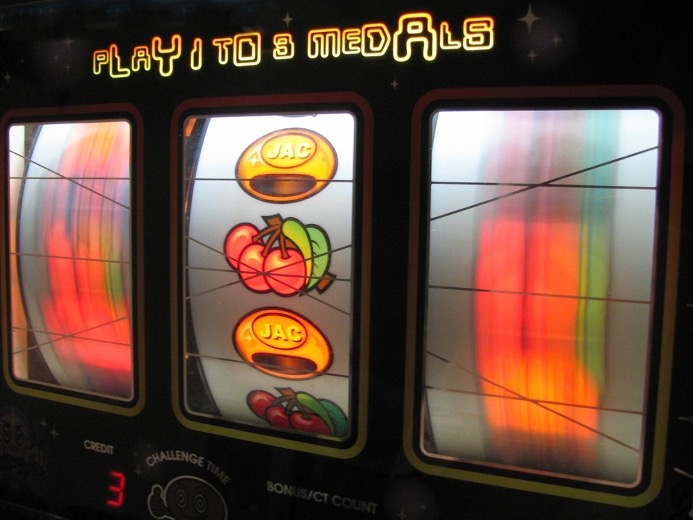
From an outsider’s perspective, a slot game is a bunch of symbols on spinning reels. Classic slots, video slots, and progressive jackpot slots games work in much the same way. Each game features several reels – typically 3 or 5, and a set amount of paylines. Mechanical slot machine games have physical reels with symbols affixed to them. Electronic slot machine games do not have any physical reels – they are digital images that are created by the computer software.
Precisely how these games function is the subject of today’s in-depth post. The concept of randomness is central to this discussion. It is hard to imagine anything that is 100% random, given that events occur because they are part of a greater system which is subject to the rules of the universe. Within that greater ‘mainframe’ or ‘construct’ is an acceptance of the concept of randomness. But what is randomness, and how does it apply to slot machine games?
Randomness: ‘The quality or state of lacking a pattern or principle of organization; unpredictability.’ (Source: Oxford English Dictionary)
If randomness entails unpredictability and no evidence of a pattern, how is it possible for human beings to program computer software to do precisely that? Our concept of random number generators is predicated on the assumption that humans do their best to ensure that random outcomes can be generated with algorithmic code and software. There is no strategy-based component to generating an outcome on a slot machine game.
Once the money has been deposited and the reels have been spun, the results generated are instantly determined by the random number generator. Unlike strategy-based games like poker and blackjack – players have no influence on the outcome of a slot game. In blackjack, your decision to hit, stand, double, split, or take insurance can have a dramatic effect on winning or losing. In slots, players rely on lady luck alone.
Possible Winning Combinations with Slots Games 
It should be remembered that the strategy-based component of slot play takes place before the reels are spun. The pre-selection of a game is where players have maximum advantage with slots games. Given the choice between a slot machine game with a 92% RTP (return to player) or a 96% RTP (return to player), the latter should always be selected. In terms of how slot machine games are programmed, consider the concept of a house edge.
The house edge is the percentage of every wager that the casino wins over the long-term on a specific game. In slots, the house edge may be 4%. Slot machine games feature reels with dozens, perhaps hundreds of symbols and perhaps thousands of winning combinations across multiple reels and pay lines. The traditional 3-reel slot machine games featuring 10 symbols on each reel has 1,000 possible winning combinations.
If blanks are inserted onto the spinning reels – which they often are, the number of possible combinations can increase to 8,000. Slots games featuring 20 symbols with 20 spaces can have as many as 64,000 winning combinations. In Las Vegas, the Megabucks slot machine games can have as many as 50 million winning combinations. As you can imagine, this is vastly different to a roulette wheel which features a green 0 slot and numbers 1-36.
Mechanical slots are rudimentary in operation. Electronic slots – online slots games – are far more complicated. For starters, the RNGs function from much greater sets of numbers, leading to exponential possibilities of combinations. If there are 20 paylines, then there are 20 possibilities of lining up winning symbols for each combination. This complicates the programming for online slots games. If there are 40 paylines or 50 paylines, the winning combination possibilities grow exponentially.
What Are the Odds of Slot Machine Games?

The RNGs are the sole determinant of whether players win or lose with slot machine games. Since we cannot see the programs that run the slot games, it is impossible to determine whether one slot has higher payouts than another. The pay table indicates the volatility, and the bonuses are further evidence of that.
Unfortunately, casinos are reluctant to post payback percentages for individual games, though they do so for categories of games (blackjack, roulette, slots, craps etc.). The proprietary nature of RNGs and the programs that govern them ensures that individual payback percentages remain unknown. In fact, the same slot machine game can have different payback percentages at the same casino.
The edge generated by the casino in a slot machine game is evident because of the difference between the true odds and what winners are paid. When choosing one slot game over another, the best way to do this is volatility. Games with free spins and bonus rounds are typically more volatile than classic slots. High volatility slot games maximize your chances of winning big payouts; however, you will be required to feed the slot machine game with plenty of cash.
The Functional Dilemma: Programming a Random Number Generator

The very concept of programming something that is designed to be completely random is a conundrum. Fortunately, casinos and online casinos are not directly involved in programming these machines – they are purchased from manufacturers who do it for them. The operator determines the most competitive payback percentages based on specific requirements.
The programming that is done is not geared towards complete randomness of outcomes – it is geared towards ensuring a specific payback percentage for the casino. Within that framework, random outcomes can be generated.
It should be noted that regardless of the RNG in operation, there is no single slot machine game that can be understood by any slots beating strategy. However, skill-based elements have already been introduced into online slots games in the state of Nevada. By incorporating greater player choice and control over actions in slot machine games, the outcomes are not assured for casinos.